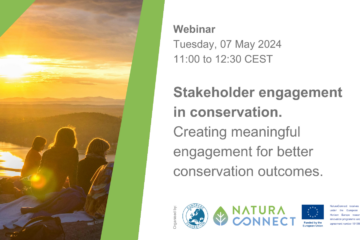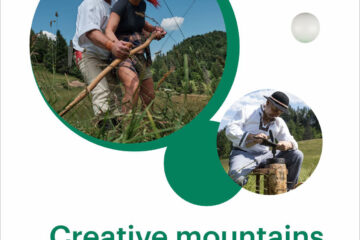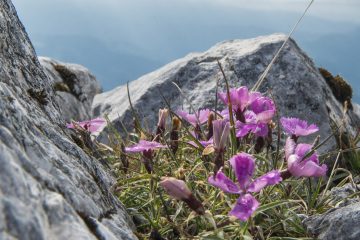Pastoralist Women in European Mountain Areas Discuss Navigating Environmental and Gender Challenges
PRESS RELEASE
13 March 2024 | Vienna, Austria
European mountainous regions host communities deeply entrenched in pastoral traditions within which pastoralist women play an indispensable role in sustaining local practices, preserving ecological balance, and fostering socio-economic development. To discuss these intersections, a Consultation Day under the Commission on the Status of Women (CSW68) gathered over 100 participants on 12 March 2024 online.
Presentations from women herders, researchers and policymakers from the Alps, Carpathians, Caucasus, Western Balkans, Pyrenees, and Apennines shed light on the challenges faced by pastoralist women in mountain areas and explored strategies for their empowerment.
The session commenced with opening remarks from Harald Egerer, Head of the UNEP Vienna Office-Secretariat of the Carpathian Convention, and Evelyn Dürmayer, representing the NGO Committee on the Status of Women Vienna. It was sponsored by UNEP and organized by the NGO Committee on the Status of Women Vienna, the NGO Committee on Sustainable Development Vienna, and the Alliance of NGOs on Crime Prevention and Criminal Justice, with the support of Eurac Research.
Esteemed speakers shared insights from their respective presentations, addressing critical issues at the intersection of environmental sustainability and gender equality in pastoralism. These presentations delved into many of the challenges pastoral women face due to entrenched gender norms that dictate work distribution, land ownership, representation in decision-making and formal institutions, economic distribution and gendered violence. These compound with climate change effects, hindering adaptation and some animal breeding activities.
To reduce these gender-related barriers, presenters discussed pathways for enhancing pastoralist women’s participation in policy planning and fostering economic empowerment: from awareness-raising initiatives, collecting recipes and cultural stories, accessing markets, to integrating their voices in environmental and agricultural policy development.
Francesca Pasetti, European Focal Point for the International Year of Rangeland and Pastoralism (IYRP) 2026, informed the audience about the goals of the IYRP, whose implementation will be facilitated by FAO, and aims at raising global awareness of the importance of pastoralism. Within the IYRP coalition, there is a working group on gender and pastoralism, which works to bring a gender lens into the IYRP process. This working group stresses that pastoralism requires 1) a deeper understanding of gender in pastoralism, 2) equitable and inalienable rights to access and use land, natural resources, biodiversity, knowledge, and information, and 3) enhanced and equitable participation of women in research, policymaking and governance related to pastoralism and rangelands.
Many speakers discussed the importance of forming networks of women herders, as highlighted by Ibolya Sáfiánné, a herder from Hungary who leads the Hungarian Women Herding Group and Laura Martinez Nuñez, a shepherdess from Spain who helped form the Ganaderas en Red. These networks not only increase visibility and solidarity among women in the sector but aim to preserve and celebrate the rich heritage of women in pastoralism.
Other innovations discussed included diversifying pastoralist women’s income streams. Caterina De Boni, a transhumance shepherdess from Italy, promoted the utilization of plant-dyed wool. Sara Manuelli from Mountain Partnership – FAO described a recent project that connected Italian fashion designers with alpaqueras in the Peruvian Andes for women to build their own economic autonomy, preserve traditions, and gain a place in the global market.
Underscoring all these presentations is the fact that despite the many challenges that women face, women pastoralists historically and continuously ensure food security, preserve rich cultural heritage, and innovate. The consultation day facilitated insightful discussions, sharing of best practices, and networking opportunities for empowering pastoralist women and highlighting environmental sustainability in mountain areas.
Presenters and Files:
Sara Manuelli: “The Mountain Partnership, a platform for bringing pastoralist women centre stage”
Ibolya Sáfiánné: “The role of women in pastoralism in Hungary”
Constanța Ștefan: ““The role of women in Romanian pastoralism and transhumance, a basic aspect of pastoralism in the Carpathians”
Caterina De Boni: “Wool as employment opportunity for woman pastoralism in Italy”
About CSW68:
The Commission on the Status of Women (CSW) is a functional commission of the United Nations Economic and Social Council (ECOSOC), dedicated to promoting gender equality and the empowerment of women. CSW68 focuses on the theme of “Empowering Pastoralist Women in Mountain Areas: Navigating Environmental and Gender Challenges,” recognizing the vital role of pastoralist women in sustaining cultural heritage and environmental sustainability in mountainous regions.
About UNEP:
UNEP is the leading global voice on the environment. It provides leadership and encourages partnership in caring for the environment by inspiring, informing and enabling nations and peoples to improve their quality of life without compromising that of future generations.
About the Carpathian Convention:
The Carpathian Convention, a multinational environmental agreement, unites the seven Carpathian countries—Czech Republic, Hungary, Poland, Romania, Serbia, Slovakia and Ukraine—in a unique partnership to protect the natural and cultural heritage of the Carpathian region while promoting sustainable development.


